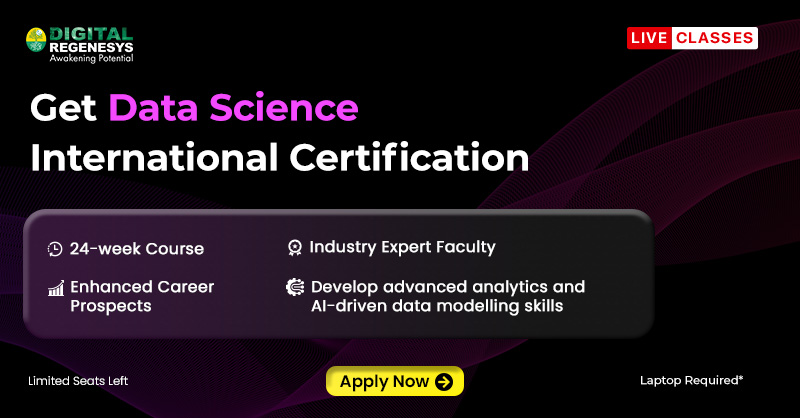Machine Learning Short Courses for Beginners

Machine Learning short courses for beginners introduce practical skills in programming, statistics, and data modelling. Positioned as an advanced component of Data Science, these courses allow learners to build foundational expertise in supervised and unsupervised learning, predictive analytics, and project-based applications. Offered flexibly online, such courses prepare participants for careers in Data Science, AI, and analytics while acting as a gateway to advanced study.
In this article, we will cover what machine learning means, why beginners should consider a short course, what they will learn, and how it supports career progression.
What is Machine Learning?
Machine learning is a branch of artificial intelligence that enables systems to learn from data and improve over time without requiring explicit programming. At its core, ML involves teaching algorithms to identify patterns, make predictions, and optimise outcomes. Within Data Science, machine learning represents the transition from simply analysing data to building predictive models that can drive strategic insights.
For beginners, machine learning can initially sound complex, but short courses break it down into practical components. By mastering the basics of machine learning as part of a Data Science journey, learners build the capacity to apply insights to real-world scenarios.
Read more on What is Machine Learning? here

Why Start with a Short Course in Machine Learning?
Starting with a machine learning short course is particularly valuable for beginners, especially those considering a career in Data Science. These courses are designed to provide essential exposure without overwhelming participants with complex theories. For professionals balancing work commitments, the shorter format makes learning more manageable.
Short courses provide a practical introduction to machine learning without requiring long-term enrolment in a degree course. They allow learners to explore whether they want to progress further in Data Science and AI. Importantly, they act as stepping stones: by completing a short course, learners gain the foundational confidence to continue with advanced study.
The benefits of short courses for beginners include:
- Accessibility – Open to professionals and graduates from diverse fields
- Time-efficient – Typically 6–12 weeks
- Practical focus – Hands-on learning with real datasets
- Progression pathway – Acts as a gateway to advanced AI and Data Science study
Read more on Why You Should Study Data Science in South Africa: A Complete Guide here
What Beginners Will Learn in a Machine Learning Short Course
Machine learning is usually positioned as an advanced module within Data Science courses. However, short courses at the beginner level are structured to make the subject approachable. Learners start by consolidating core skills such as Python programming, statistics, and data visualisation, which provide the foundation for understanding machine learning concepts.
Once comfortable with these basics, learners progress into machine learning itself. Beginners will explore both supervised and unsupervised learning techniques, understand how models are trained and tested, and gain experience working with popular libraries such as scikit-learn and TensorFlow. Importantly, learning is often project-driven, ensuring that participants can apply theoretical concepts to real-world problems.
Key components typically covered include:
- Introduction to algorithms – Regression, classification, clustering.
- Model evaluation – Accuracy, precision, and recall.
- Data preprocessing – Cleaning, transformation, and handling missing values.
- Hands-on coding – Applying models to datasets using Python.
Read more on Is Data Science Hard? Explore Learning Paths and Required Skills here
Who Should Take a Machine Learning Short Course?
The machine learning module is part of the broader Digital Regenesys Certification Course in Data Science and is considered an advanced stage of study. However, it remains accessible to beginners, even those with no prior exposure to machine learning, because the Data Science course is designed to build progressively. It starts with core foundations such as Python programming, statistics, and data visualisation, before moving into more advanced topics such as machine learning.
This makes the module suitable for:
- High school graduates who are academically strong and eager to begin their journey into Data Science and machine learning.
- Graduates in IT, business, engineering, or science who want to expand their analytical expertise.
- Professionals seeking a career pivot into Data Science or artificial intelligence.
- Beginners in Data Science courses who are ready to advance into machine learning after covering foundational modules.
- Entrepreneurs and managers who wish to understand how machine learning can influence data-driven strategies.
By offering a structured and supportive pathway, the machine learning module removes much of the intimidation often associated with advanced study, while still equipping learners with practical, career-focused skills.
Read more on Where to Study Data Science? Learn Skills and Benefits here
Duration, Structure, and Mode of Learning
Machine learning short courses are designed to balance depth with flexibility, making them suitable for both students and working professionals. While many short courses in the market last between 6 and 12 weeks, the Digital Regenesys Data Science course offers a more structured progression:
- The full Data Science package runs over 24 weeks, covering foundational topics such as Python, statistics, data visualisation, and analytics before advancing to specialised modules.
- The advanced modules, including Machine Learning, run for 16 weeks, focusing on practical applications, predictive modelling, and advanced techniques.
The structure combines theory with practice, including coding exercises, structured assessments, and project-based applications. Learners work with real-world datasets to strengthen their problem-solving skills and gain confidence in applying machine learning to real scenarios.
At Digital Regenesys, the mode of learning is entirely online, offering the flexibility to study at your own pace while maintaining access to guided feedback and academic support. This makes the course both comprehensive and adaptable for learners at different stages of their academic and professional journeys.
Read more on How to Study Data Science: A Complete Guide for Beginners here
Career Benefits of Starting with an ML Short Course
A machine learning short course provides both immediate and long-term career benefits. It lays a solid foundation for further study in Data Science and artificial intelligence, while also creating opportunities to apply ML skills in professional settings.
Some of the roles learners may pursue after completing such a course include junior data analyst, machine learning assistant, or project support specialist. These roles help build practical experience and act as stepping stones to more advanced positions in data-driven industries.
Additional benefits include:
- Professional credibility – Certificates strengthen CVs and LinkedIn profiles.
- Upskilling across fields – Finance, marketing, engineering, and IT increasingly require professionals with ML knowledge.
- Pathway to leadership – Understanding machine learning helps professionals make informed, data-driven strategic decisions.

Conclusion
Machine learning short courses for beginners provide an accessible and practical way to explore one of the most advanced areas of Data Science. They offer professionals and graduates the opportunity to develop coding, statistical, and analytical skills, while also serving as a gateway to deeper study in AI and related fields. By starting with a short course, learners build both confidence and credibility, making them better equipped to meet the demands of modern industries.
Digital Regenesys offers structured, flexible courses that help learners progress from beginner-level Data Science to advanced machine learning.
To explore more and to enrol in our IITPSA-accredited Data Science course, visit Digital Regenesys today!
Last Updated: 9 October 2025